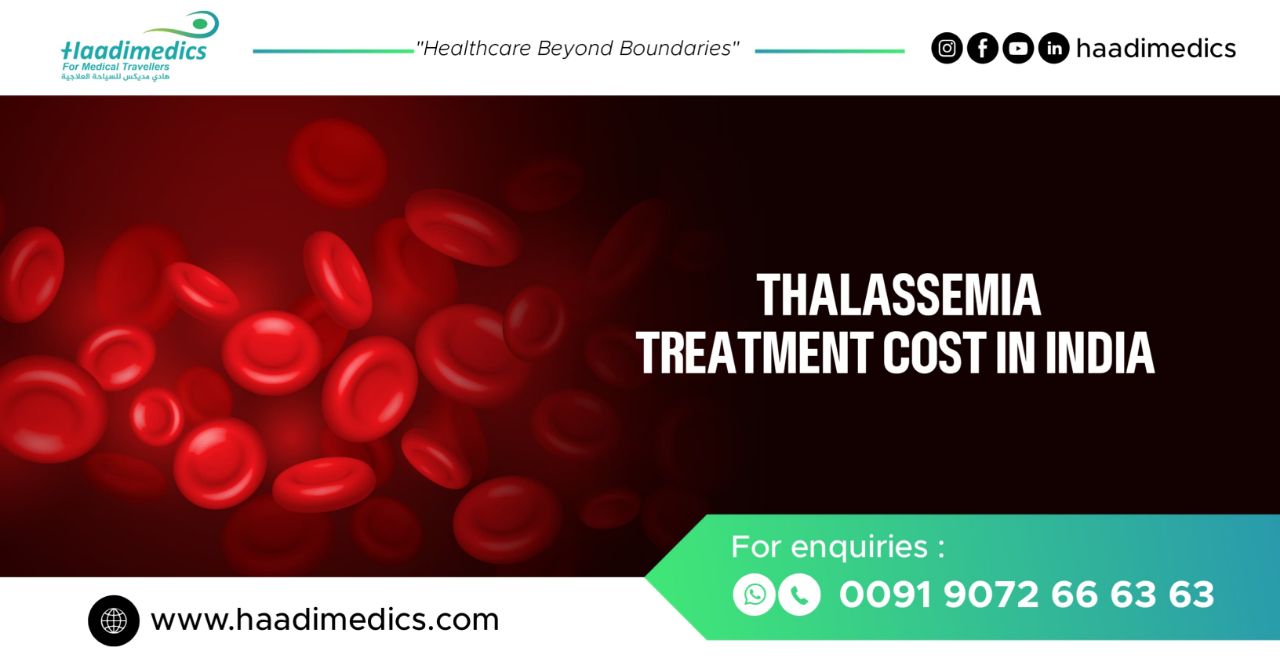India has emerged as a frontrunner in providing effective thalassemia treatment, combining affordability with advanced medical expertise. With a comprehensive network of hospitals and skilled healthcare professionals, India offers hope to individuals affected by thalassemia at a fraction of the cost compared to many other nations.
What is Thalassemia?
A genetic blood condition called thalassemia is characterized by aberrant hemoglobin production. Insufficient hemoglobin causes the red blood cells in the body to work less effectively and to live for a shorter period, which reduces the number of healthy red blood cells in the bloodstream. This medical condition requires specialized treatment to manage symptoms and improve quality of life.
Thalassemia is often categorized into several stages based on its severity such as trait, minor and intermedia/major. A trait indicates that you may exhibit mild anemia symptoms or none at all. A major is a serious condition in which medical attention is mandatory.
Why is it done?
Thalassemia treatment aims to alleviate symptoms, prevent complications such as anemia and organ damage, and enhance the overall well-being of patients. Depending on the severity of the condition, treatment may involve blood transfusions, iron chelation therapy, bone marrow transplant, or gene therapy.
What are the Symptoms?
Some common symptoms of Thalassemia are;
- Fatigue
- Pale or Jaundiced skin
- Shortness of breath activity or exertion.
- Weakness and lightheadedness
- Delayed growth and development in children
- Bone deformities
- Enlarged spleen and liver
- Dark urine
- Frequent infections
- Facial bone changes
Preparation
Before undergoing thalassemia treatment, patients undergo comprehensive assessments to determine the extent of the condition and the most suitable treatment plan. This may involve blood tests, genetic screening, and consultations with hematologists and other specialists. Patients are also advised to maintain a healthy lifestyle and adhere to any pre-treatment instructions provided by their healthcare providers.
Procedures
Blood transfusions are a common treatment option to replenish healthy red blood cells and alleviate anemia symptoms.
Iron chelation therapy helps remove excess iron from the body, reducing the risk of organ damage.
For eligible patients, bone marrow transplant or gene therapy may offer a potential cure by replacing defective bone marrow cells with healthy ones.
What to Expect?
Before treatment, patients receive detailed information about the procedure, potential risks, and expected outcomes.
During treatment, patients may experience discomfort, fatigue, or other side effects, which can be managed with medications and supportive care.
After treatment, regular follow-up appointments are essential to monitor progress, adjust treatment as needed, and address any concerns or complications.
Different types of Treatment
In addition to blood transfusions and iron chelation therapy, other treatment options for thalassemia include;
1. Bone Marrow Transplantation: A procedure to replace damaged bone marrow cells with healthy ones from a compatible donor.
2. Gene Therapy: Experimental treatments aimed at correcting genetic defects responsible for thalassemia, potentially offering a cure for the condition.
Best Hospitals in India
- Christian Medical College (CMC), Vellore
- Apollo Hospitals, Chennai
- Sir Ganga Ram Hospital, New Delhi
- Tata Medical Center, Kolkata
- Fortis Memorial Research Institute, Gurgaon
- Indraprastha Apollo Hospital, New Delhi
- Medanta, The Medicity, Gurgaon
Best Doctors for Thalassemia Treatment
- Dr. Rahul Bhargava, Fortis MRI, Gurgaon
- Dr. Pawan Kumar Singh, BLK Super Speciality Hospital, New Delhi
- Dr. Dharma Choudhary, Sanar International HospitaL
- Dr. Vikas Dua, Fortis MRI, Gurgaon
- Dr. Soumya Bhattacharya, Apollo Gleneagles Hospital, Kolkata
- Dr. Gaurav Kharya
- Dr. Srikanth M
- Dr. Prabu P
- Dr. Revathi Raj - Christian Medical College (CMC), Vellore
Top Nations in Thalassemia Treatment
Besides India, other countries known for their expertise in thalassemia treatment include Italy, Greece, Cyprus, and Turkey, where specialized centers and research institutions focus on managing and treating this genetic disorder.
Cost Comparison
New Delhi – USD 9900
Chennai – USD 10220
Mumbai – USD 10470
Bangalore – USD 9900
Hyderabad – USD 9800
Turkey – USD 48000
Thailand – USD 17600
Singapore – USD 160000
USA – USD 128000
FAQ
1. What causes thalassemia?
Thalassemia is caused by mutations in the genes responsible for hemoglobin production, leading to abnormal red blood cell formation.
2. Is thalassemia curable?
While thalassemia is not curable in all cases, treatments such as bone marrow transplant and gene therapy offer potential cures for certain patients.
3. How often do thalassemia patients require blood transfusions?
The frequency of blood transfusions varies depending on the severity of the condition and the individual patient's needs, but it may range from once every few weeks to once every few months.
4. What is iron chelation therapy, and how does it work?
Iron chelation therapy involves the use of medications to remove excess iron from the body, which accumulates due to frequent blood transfusions, helping prevent organ damage.
5. What are the risks associated with bone marrow transplant for thalassemia?
Risks of bone marrow transplant include infection, graft-versus-host disease, and rejection of the donor cells, among others. However, advances in transplantation techniques have significantly reduced these risks.
6. Can thalassemia be prevented?
While thalassemia is a genetic disorder, prenatal genetic testing and counseling can help identify carriers and prevent the transmission of the condition to future generations.
7. Are there any dietary restrictions for thalassemia patients?
Thalassemia patients may benefit from a balanced diet rich in iron, folate, vitamin C, and other nutrients to support overall health and manage symptoms.
8. What is the success rate of gene therapy for thalassemia?
Gene therapy for thalassemia is still in the experimental stage, with ongoing clinical trials evaluating its safety and efficacy. Initial results have shown promising outcomes in certain patient populations.
9. Can thalassemia patients lead normal lives?
With appropriate treatment and management, many thalassemia patients can lead relatively normal lives, although they may require regular medical care and monitoring.
10. Is genetic counseling recommended for families with a history of thalassemia?
Yes, genetic counseling can help individuals understand their risk of carrying thalassemia genes and make informed decisions about family planning and reproductive options.


Comments